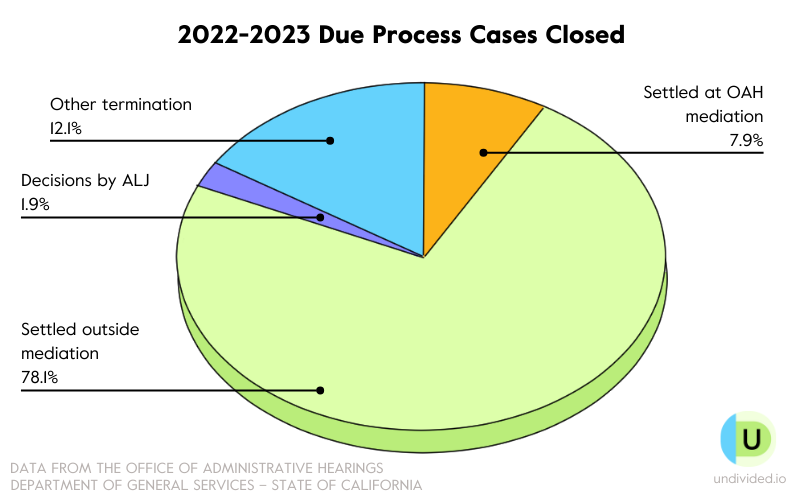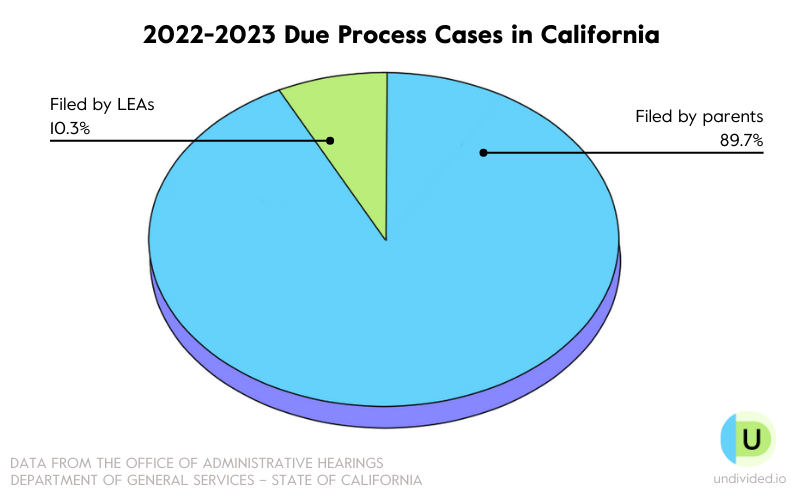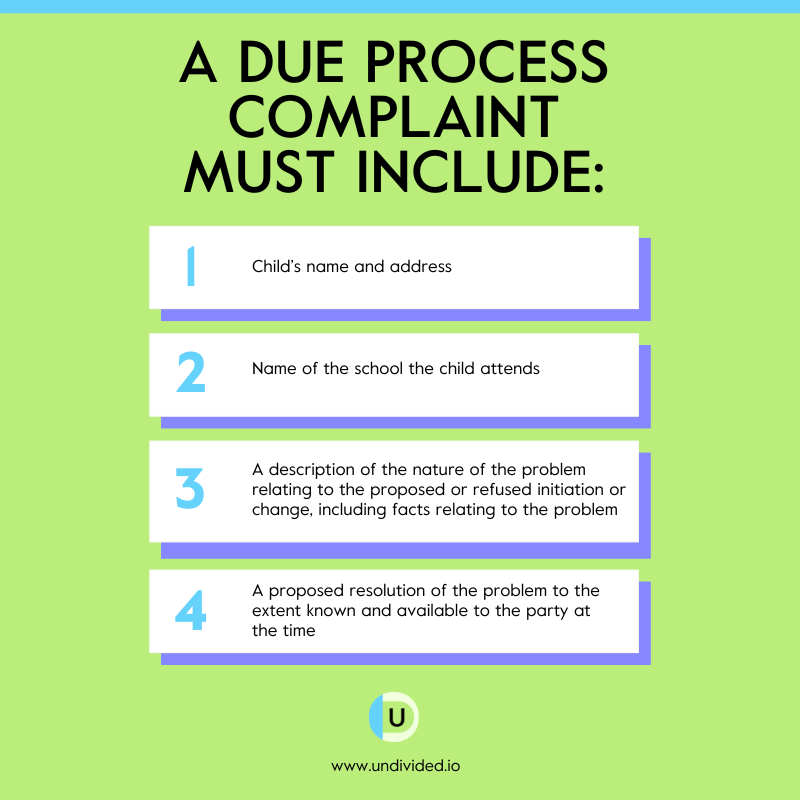IEP Due Process Filing, Mediation, and Hearing
Filing for due process in special education
If you have already moved through informal dispute resolution or mediation and the settlement process and are still unable to reach an agreement with your district, you may be ready to file a due process complaint (DPC) on behalf of your child. In most states, special education arbitration is handled by the Office of Administrative Hearings (OAH).
Do you need an attorney?
It’s important to know that filing a DPC is similar to filing a lawsuit. You do not need to go through an attorney, but you are more likely to be successful if you do. Dina C. Kaplan, a special education attorney at Vanaman German LLP, tells us, “Although the due process system was originally designed to give parents access to a way to resolve disputes without involving the courts, due process has in practice become major litigation.” You are making a legal complaint and “an allegation that your school failed to follow the law.” The hearing procedures, case law, rules of evidence, and witness testimony are very similar to a court of law, and expert counsel is needed to be successful.
Chris Arroyo told Undivided, “Our general recommendation to folks is that they do obtain an attorney for due process in special education.” He explained that there are many reasons, “one of the largest being that those hearings follow the rules of evidence, which is an entire body of law unto itself.”
Your local education agency (LEA) or district can also file a DPC to resolve a disagreement. If this happens, you should consult an attorney. If you're a California resident and your child is a Regional Center client, you can also seek advice from the office of Clients Rights Advocates at Disability Rights California. (You can also consult with a free or low-cost attorney.)
What needs to be included in the due process complaint is detailed in IDEA section Sec. 300.508. You can file for “Mediation only,” “hearing only,” or “mediation and hearing.” After you file the complaint, you will receive a scheduling order within a few days that indicates the hearing date and other relevant dates such as the resolution meeting, mediation meeting, and the pre-hearing conference.
Resolution meeting
Formal mediation to address IEP disputes
If the resolution meeting is unsuccessful or waived, the next step is a formal mediation meeting. This is not mandatory, but as most cases are resolved in mediation, it is recommended. For the vast majority of parents who file for due process, this mediation will be the outcome of the process.
For example, according to the OAH Special Education Division’s quarterly data report for 2022–2023, approximately 4,549 families went into due process in California. Of these, 56 were settled at the resolution meeting. With the OAH mediating, 301 ended with a settlement. The majority of cases — 3,523 — were settled, but not at the resolution meeting nor the mediation. Only 84 went before an Administrative Law Judge (ALJ) in a hearing.


What will happen at your mediation meeting?
Your mediation meeting will be facilitated by an ALJ from the Office of Administrative Hearings. They will first ask all parties to sign a confidentiality agreement: what happens in the mediation meeting stays in the mediation meeting, and does not affect the outcome of any later hearing.
Preparing for mediation
You will prepare for the mediation meeting with your attorney. It is useful to prepare a list of priorities in terms of ideal outcomes and what you are willing to concede, but also to have one “no deal” priority that you cannot settle without. It’s unfortunately easier than you think to leave a settlement with everything except the thing you actually wanted in the first place, and that would be a waste of effort.
Make sure you have child care coverage and someone to pick up your child from school. Prepare snacks and water for yourself. There can be a lot of waiting periods when the district is consulting with their legal team outside of the room. It is useful to have something to do to de-stress during that time, such as a book, crossword, or magazine.
What to expect
OAH mediation meetings (and hearings) may take place at the school district office or through Microsoft Teams. There is a joint room where everyone meets and a room for each party to meet with the judge for discussion.
The judge will begin in the joint room by asking both sides about any offers that have emerged in the earlier discussions. The parties will be asked to put forward their conditions for settlement, and the process will go back and forth until you both agree. It can be a long day. In larger school districts, the meetings may be scheduled for half a day only.
Settlement agreement
If you come to an agreement in the mediation meeting, the terms will then be written into a settlement agreement, which you will sign while there. Make sure your agreement stipulates whether those terms will be written into the IEP, and whether they will end at the next annual IEP. Be sure you understand the implications of any waiver of your child’s rights. The terms should also stipulate your “stay put,” should you disagree again at the next IEP.
Typically, this agreement also covers the cost of attorneys used in the mediation process. Dina Kaplan explains that it’s difficult to estimate what the cost will be, because “every case is different and requires different amounts of legal work. Districts will usually agree to pay some of the attorney fees, and any balance of fees would then be determined between attorney and client.”
In most cases, the settlement needs to be approved by the Board of Education. This is done confidentially in a closed session. Once the board has voted on your settlement, the OAH will close the case.
The due process hearing
In very rare cases, the mediation meeting will be unsuccessful in settling the disagreement. Often, the district will offer a settlement at this point before going to a hearing with a different judge.
Preparing for the hearing requires selecting the most appropriate documentary evidence to prove your case, and finding expert witnesses to make the case. Note that any fee you pay for an expert witness cannot be reimbursed in legal fees, whatever the outcome of your case.
Pre-hearing conference
If you are represented by an attorney, the ALJ will only invite your attorney and the district’s legal counsel to the pre-hearing conference. The ALJ will expect to get a clear idea of how many witnesses and pieces of documentary evidence are expected. All the documents and lists of witnesses must be uploaded five days before the hearing. If you are not working with an attorney, the ALJ is used to working with parents who represent themselves. To help you know what to expect, the OAH offers a guide to preparing for the hearing.
What to expect from the hearing
The hearing itself works just like a court of law. As with mediation meetings, hearings may take place on Microsoft Teams, at the school district office, or at the OAH offices.
Both sides make their case using documentary evidence and call witnesses who know the child or are experts in the field. Often, the parents themselves do not speak if represented by counsel. The party that filed the case has the burden of proof, so if you initiated the DPC, it is your or your attorney’s job to show why the hearing officer should find in your favor.
Parents should know that the vast majority of cases that go to hearing are found in favor of the district. According to an OAH Special Education Accountability Report, of the 452 cases that came to a hearing between 2008 and 2019, the student (family) prevailed in only 93 (20%) cases.
What happens next?
When the Administrative Law Judge makes a decision, it becomes an enforceable, public document. You will be able to read your decision on your state's OAH website. These decisions are very individualized and therefore do not create a precedent for future cases. Also note that the decision often only obligates the school district until the next annual IEP.
IDEA effectively prevents families from accessing the courts over special education issues outside of due process. Very few cases reach the U.S. District Courts, and those that do — such as Endrew F. v. Douglas County and Sacramento City Unified Sch. Dist. Bd. of Educ. v. Rachel H. — can take many years. Often, the student has left the education system by the time such a case is resolved.
Whether your case is resolved during mediation or you go through a due process hearing, remember that you will likely need to keep working with the school for many years during your child's education. Undivided's Education Advocate Lisa Carey has this advice:
File for due process
Join for free
Save your favorite resources and access a custom Roadmap.
Get StartedAuthor



